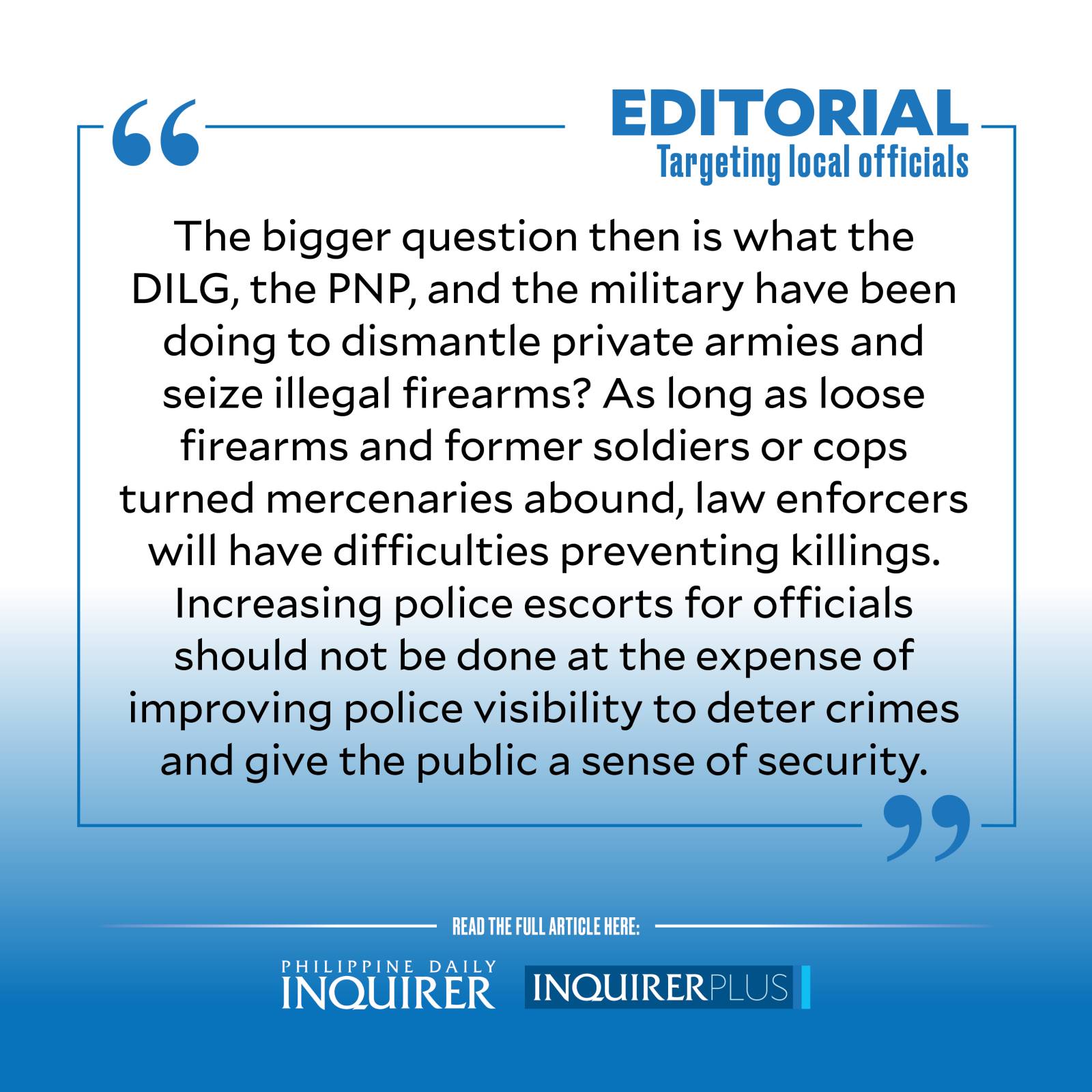
Could politics—the settling of scores after last year’s hotly contested elections—be behind the spate of killings of local officials in recent months? Or have criminals been emboldened by lax law enforcement and poor intelligence among the country’s police force?
Barely a month since President Marcos Jr. assumed office last year, the series of violent killings of local officials began, with former Dolores, Quezon mayor Danilo Amat, and Lamitan City, Basilan mayor Rose Furigay shot dead in July 2022. Since then, more local officials have fallen, seven as of latest count. They include former Lobo, Batangas vice mayor Romeo Sulit in August 2022; former Dipaculao, Aurora vice mayor Narciso Amansec in October 2022; former Calbiga, Samar vice mayor Miguel Abaigar Jr. also in October; Aparri, Cagayan Vice Mayor Rommel Alameda in February 2023, and Negros Oriental Gov. Roel Degamo on March 4.
Assassination attempts were also made on two incumbent officials, Lanao del Sur Gov. Mamintal Adiong Jr. and Mayor Ohto Montawal of Datu Montawal town, Maguindanao del Sur province, both in February.
In a resolution condemning the killings, Sen. Grace Poe noted that the killings have sparked “fears on our people about how easily lives can be taken even of people who are in power.” The breakdown in the country’s law and order was also cited in the resolution, which quoted results of a 2023 Social Weather Stations survey released on Feb. 7, that showed 50 percent of respondents saying they are “afraid to walk the streets at night because it is not safe.”
Politics seems the most likely culprit, with Mr. Marcos describing the Degamo case as “purely political.” In her resolution calling for a thorough probe on the driver and motive behind the killings, Sen. Risa Hontiveros noted that the gun, and not the Commission on Elections, has become the final arbiter in elections. Indeed, the Degamo killing has all the hallmarks of a political act, with the governor finally taking his post only in October last year, after votes for a namesake nuisance candidate were counted in his favor, and unseated closest rival Pryde Henry Teves. His brother, Negros Oriental 3rd District Rep. Arnie Teves quickly denied he was behind the killing. But on Tuesday, the police named him a respondent in at least three killings in Negros Oriental in 2019.
Not that police are off the hook. Philippine National Police chief Gen. Rodolfo Azurin Jr. has admitted negligence on the part of the police in securing Degamo, and that “the security personnel have become lax.” With an eight-member security detail unable to protect the governor, could poor police intel be a factor as well? Or were the police distracted by the mass resignation asked of them by the Department of the Interior and Local Government (DILG) as part of its anti-drug purge? With no one left to mind the store, so to speak, hired guns had a field day plying their nefarious trade.
While police have also blamed organized crime groups for the Degamo killing, the more alarming information is that, according to Police Col. Gerard Ace Pelare, spokesperson for the Special Investigation Task Group Degamo, the four suspects arrested were all former military personnel who had been dishonorably discharged from the service for various offenses involving illegal drugs and for going absent without leave. How many of these former soldiers or cops have been let loose without the government monitoring, if they have become mercenaries?
Yet, the knee-jerk reaction of the police and politicians to the killings could only spark more panic. The PNP vowed to increase the number of police escorts from two to six for officials with “validated threats’’ to their lives, prompting several House members to ask: “How about us?” At least six senators are reportedly practicing target shooting as an extra precaution. With this climate of fear, politicians are likely to justify maintaining their private armies to protect themselves.
But how about the ordinary people—aides, staff, and bystanders—who might become collateral damage to these killings? They have no influence or voice to seek heightened protection for themselves.
The bigger question then is what the DILG, the PNP, and the military have been doing to dismantle private armies and seize illegal firearms? As long as loose firearms and former soldiers or cops turned mercenaries abound, law enforcers will have difficulties preventing killings. Increasing police escorts for officials should not be done at the expense of improving police visibility to deter crimes and give the public a sense of security.
And more importantly, the police should ensure that the brains behind the killing of Degamo and other local officials are unmasked, prosecuted, and jailed. If only the henchmen are held accountable, these murderous masterminds will continue to make a mockery of our laws and institutions for their selfish interests.

